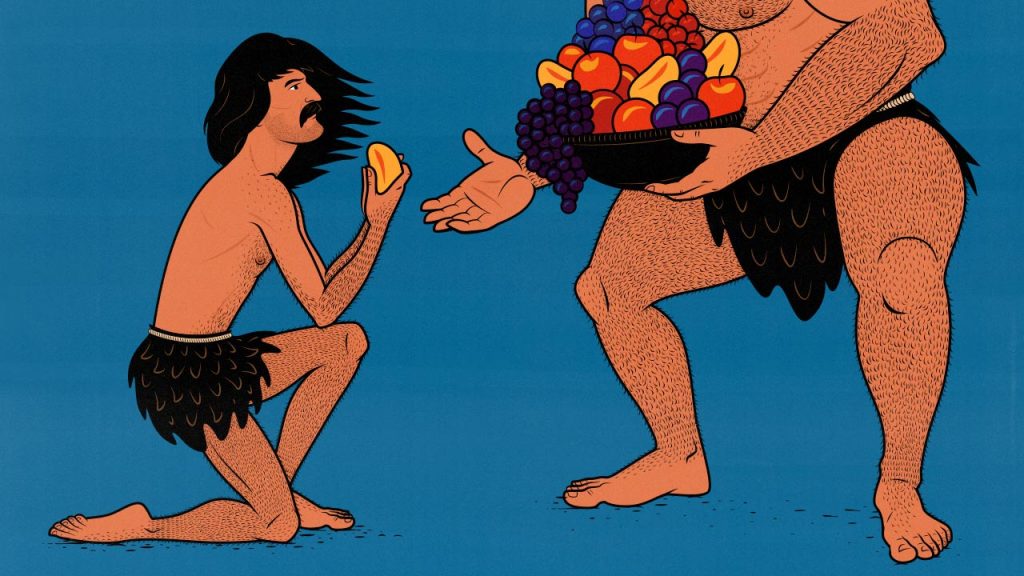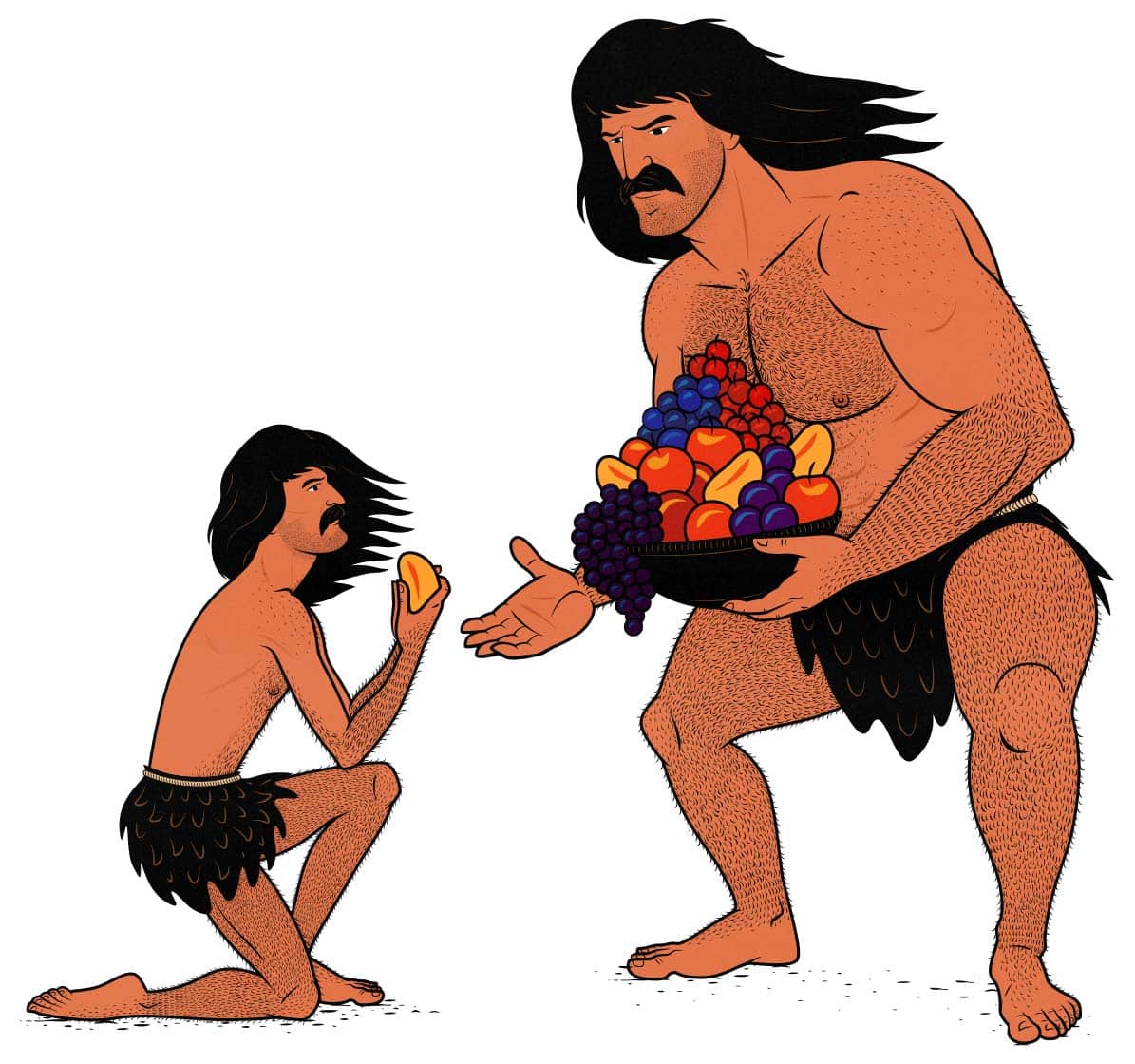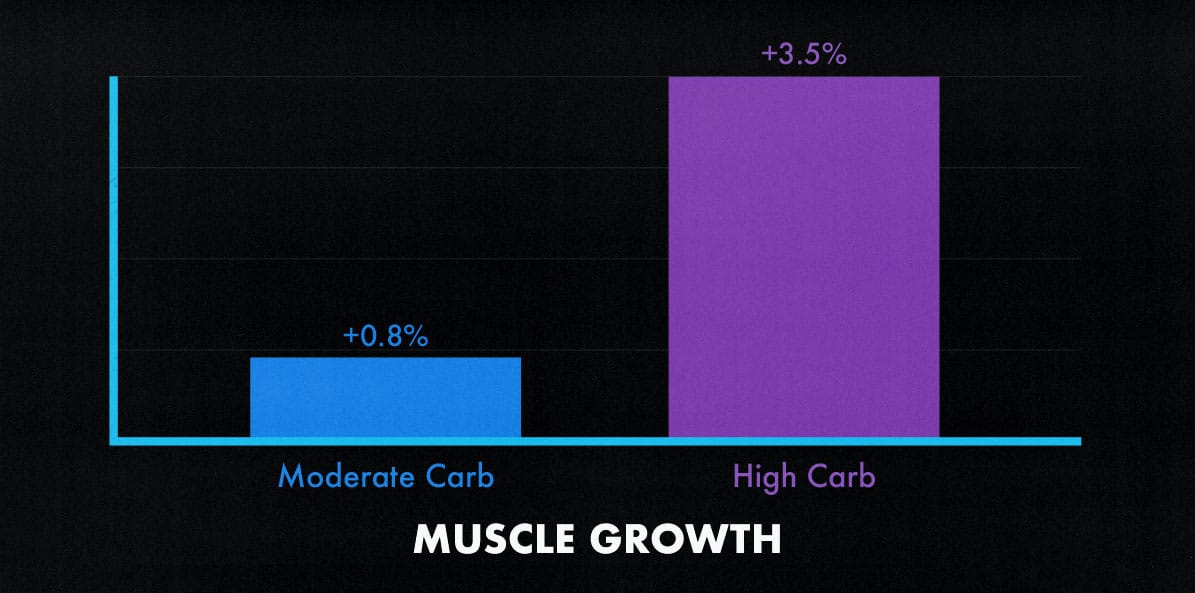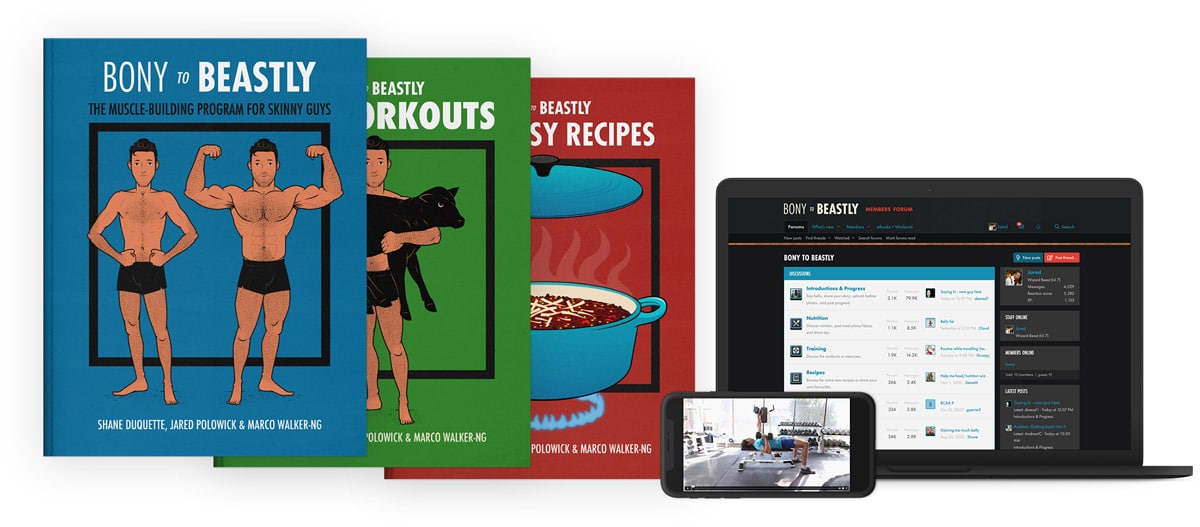
How Many Carbs Should You Eat to Build Muscle?
Bodybuilders traditionally eat high-carb diets while bulking, getting anywhere from 50–60% of their calories from carbohydrates. Carbs are a great source of calories, they can be relatively easy to digest, they’re rich in nutrients, and they’re fantastic for building muscle.
In this article, we’ll talk about the benefits and downsides of eating so many carbs, cover the latest research, and then give you some modern recommendations.

What Are Carbs?
Carbohydrates (carbs) are one of the three primary macronutrients (along with proteins and fats) that make up the caloric content of food. They come in three main types: sugar, starch, and fibre.
- Sugars: Simple carbohydrates found naturally in fruits, milk, and honey. They’re a fast and efficient source of energy.
- Starches: Complex carbohydrates found in foods like beans, oats, potatoes, and rice. They’re broken down into glucose during digestion, providing a slower but steadier energy source than sugar. This is where bodybuilders get most of their calories.
- Fibres: Carbohydrates that are more difficult to digest. They’re found in foods like oats, beans, nuts, fruits, and vegetables. They strengthen our digestive systems and help regulate blood sugar levels. On the other hand, fibre only contains half as many calories per gram as sugars and starches, making it quite a bit more filling.
You’ll notice that most unprocessed carbs have fibre, whereas processed foods often contain just sugar or starch. That’s one of the reasons whole foods are better for our health, better for our digestive systems, and better for building muscle. All carbs are good for building muscle, though.
Do Carbs Help Build Muscle?
Carbs are fantastic for building muscle (full explanation). They contain the energy we need to convert the protein we eat into muscle mass. That’s true of protein and fat as well. However, carbs also have several unique benefits.
- Carbs are an important part of a balanced diet. Fruits and vegetables are rich sources of fibre, vitamins, minerals, phytonutrients, and other micronutrients. Fibre, in particular, is great for improving digestive health, which is especially important while bulking up.
- Carbs can be stored directly in our muscles as muscle glycogen. The more carbs we eat, the more glycogen we store in our muscles, making them fuller and harder, giving them greater endurance, and speeding up our rate of muscle growth (study, study, study). This is why carbs are so popular with bodybuilders.
- Some carbs contain nitrates, giving us better muscle pumps. Carbs like watermelon, spinach, beets, and carrots are rich in dietary nitrates. These are the same nitrates you find in “pump” supplements. They improve blood flow to our muscles, increasing our rate of muscle growth (study).
A diet rich in nutritious carbohydrates is rich in energy, fibre, vitamins, minerals, nitrates, and many other powerful micronutrients. Your muscles will be fuller and harder, have more endurance, better blood flow, and grow faster.
Are High-Carb Diets Ideal for Building Muscle?
We know that carbs are good for building muscle. We also know that ketogenic diets can make it harder to bulk up. But what if we compare moderate-carb diets against high-carb diets? Do the extra carbs help us build extra muscle?

High-carb diets do seem to be better for building muscle. A recent study hinted that 5g/kg/day yielded slightly more muscle growth than 3g/kg/day. The difference was quite dramatic. However, the findings didn’t reach statistical significance, so we can’t say for sure (study).
Do Carbs Cause Fat Gain?
Any type of food can cause fat gain when eaten in excess. Carbs are no exception. But they aren’t especially fattening when compared to protein or fat.
Carbs do taste good, though, and processed carbs can be an easy way to pack in calories. If you eat too many calories, you’ll gain weight. If you gain weight too quickly, or if you aren’t following a good workout program, you might gain more fat than muscle. You can’t blame that on carbs, though.
You could argue that carbs spike insulin, which carries carbs toward our muscles and fat. That’s true, but it’s not bad. We want our bodies to deliver nutrients where we need them. That’s what insulin is for. That’s why we produce it.
So, no, carbs don’t cause fat gain. Just don’t go overboard with the sweets. Eat a healthy and balanced diet. Usually, that means keeping added sugars to under 10% of your total calories. Get the bulk of your carbs from whole foods like fruits, vegetables, potatoes, beans, lentils, and whole grains (like oats, corn, brown rice, quinoa, and so on).
Carb Recommendations
How Many Carbs for Muscle, Strength & Fitness
There’s quite a bit of research looking at how carbs affect bodybuilders, athletes, and strength athletes (like powerlifters and strongmen). In all three fields, virtually all experts recommend that we get around half of our calories from carbohydrates.
- Bodybuilding: we’re told to get 40–60% of our calories from carbohydrates to increase our rate of muscle growth (study, study).
- Strength training: The National Strength & Conditioning Association recommends getting 45–65% of our calories from carbohydrates to help us gain muscle mass and strength.
- Sports performance: The Journal of the International Society of Sports Nutrition recommends eating enough protein to build muscle, enough fat to absorb vitamins and regulate our hormones, and then getting the rest of our calories from carbohydrates. Usually, that’s around 20–30% of our calories from protein, 20–30% from fat, and 50–60% from carbs.
How Many Carbs to Eat Per Day
If you’re tracking your calories, aim for at least 3 grams of carbs per kilogram of body weight per day to maximize your rate of muscle growth. That’s a minimum target, so feel free to eat far more carbs if you so desire.
The Best High-Carb Foods for Building Muscle
The best bulking diets are made up mostly of whole foods. Unprocessed carbs are some of the most nutritious foods, packed with phytonutrients, fibre, vitamins, minerals, and antioxidants. As such, the best sources of carbohydrates are:
- Fruits, such as bananas, passion fruits, mangoes, papayas, oranges, and squash.
- Dried fruits, such as raisins, dried cranberries, dried cherries, and dried mangoes.
- Berries, such as frozen mixed berries, blueberries, cherries, and blackberries.
- Starchy vegetables like potatoes and sweet potatoes.
- Squash, such as pumpkin.
- Legumes, such as beans, lentils, green peas, and soybeans.
- Dairy (and alternatives), such as Greek yogurt, kefir, milk, soy milk, and oat milk.
- Whole grains, including oats, rice, quinoa, whole wheat, and corn.
- Honey.
I’ve underlined the carbs most popular with bodybuilders, but the other types of carbs are just as nutritious, and a more varied diet will give you a wider array of nutrients. You can also get carbs from processed foods like pasta, white rice, and whole-grain bread. Those foods don’t tend to contain as many phytonutrients or as much fibre, but they can still be part of a balanced diet, especially if you’re eating them alongside other whole foods.
If you’re having trouble eating enough carbs, try snacking on bananas, blending up some bulking smoothies, having some muesli or oatmeal for breakfast, or having larger servings of rice, beans, or potatoes with your meals.
The Bigger Picture
A wide range of carb intakes can be good for building muscle. Even if you’re following the research to the letter, you can still get anywhere from 40–65% of your calories from carbs. Also, the quality of your workout program, diet, and lifestyle matter far more than the exact proportion of carbs, protein, and fat you eat.
Carbs are important, too. Don’t get me wrong. But master the basics before you start tracking your macros. The most important factors are:
- Training for muscle size. The most powerful muscle-building stimulus comes from exercise—from resistance training. The style of resistance training designed to help you build muscle is called hypertrophy training.
- Eating enough calories to gain weight. Overweight people can build muscle while losing fat, especially if they’re new to lifting weights. But if you’re skinny, as I was, there’s only one way to go from 130 to 190 pounds—you must gain weight.
- Getting enough good sleep. When you get enough good sleep, you have more energy, more willpower, greater insulin sensitivity, and produce more testosterone. You also build more muscle. We recommend getting 7–9 hours of sleep every night. 8 hours is a good default.
Conclusion
Getting 40–65% of your calories from carbs is great for building muscle. It’s also a balanced and healthy way of eating. And it will improve your performance in and out of the gym. However, you don’t need to be very precise. Just think of eating plenty of fruits, berries, starchy vegetables, beans, lentils, soy, yogurt, and whole grains. If most of your meals have a source of carbs in them, you’ll do great.

Alright, that’s it for now. If you want to know all the ins and outs of building muscle, we have a free newsletter. If you want a full foundational bulking program, including a 5-month full-body workout routine, gain-easy diet guide, recipe book, and online coaching, check out our Bony to Beastly Bulking Program. Or, if you want a customizable intermediate bulking program, check out our Outlift Program.

